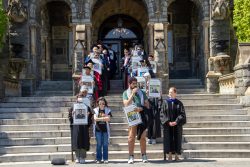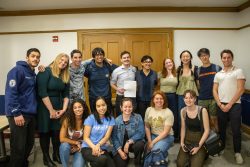As part of the administration’s efforts to move beyond last year’s tension over alcohol-related issues, officials are submitting a grant proposal aimed at securing funds for non-alcoholic programming.
Vice President for Student Affairs Juan Gonzalez said that the proposal involves “sensitive issues” and refused to disclose details. “We need to give the donor the opportunity to say yes, so I cannot identify the person or the organization we submitted” the grant to, he said.
The goal of establishing alcohol-free venues attractive to students follows last year’s arrests of students at off-campus bars and the fight over the Block Party. Gonzalez angered some students last fall when he declined to support the Block Party, seen as one of few events that fosters a sense of community among students. The event raises money for charity but had been criticized, especially by residents of the Georgetown neighborhood, because alcohol was getting served to underage students.
Meanwhile, student government officials are circulating their own proposal for increasing on-campus programming, but focused on the Leavey Center, which has long been considered an inadequate student union. One proposal was drawn up by Georgetown University Student Association President Ryan DuBose (CAS ‘02) and GUSA Vice President Brian Walsh (CAS ‘02). DuBose said he submitted the proposal to Gonzalez and other adminstrators two-and-a-half weeks ago. Gonzalez said that DuBose and Walsh and Bauer’s proposal would be further considered if the grant is received.
DuBose and Walsh said that Gonzalez told them he was considering applying for a grant from Anheuser-Busch proposal for non-alcoholic programming. The students said they did not know if the Anheuser-Busch proposal had already been submitted. Gonzalez declined to comment on specific organizations.
Anheuser-Busch could not be reached Wednesday afternoon, but such funding would not be new. In 1999, it launched an advertising campaign on responsible drinking.
DuBose and Walsh’s proposal asked for at least three computer terminals and one printer to be installed in Sellinger Lounge in Leavey, which now features no easily accessible public computers or printers.
The proposal also asked for a permanent screen to be installed so students could watch the basketball’s teams’ away games as well as for money to be appropriated for sound and lighting equipment to accommodate a cappella groups and other performing arts organizations.
DuBose said that these ideas were gathered from past proposals and from an editorial in The Georgetown Independent. He said that no cost estimate on the proposals has been made.
Last year’s GUSA Vice President Jacques Arsenault (CAS ‘01) said he sought similar improvements while in office but there was some opposition from some students and administrators who wanted to keep the Sellinger Lounge as a quiet place for study and socializing. The cost of terminals was also an obstacle, although he could not cite any specific estimate.
DuBose said that he has not had time to review another proposal for improving Leavey drawn up by GUSA Representative Ted Bauer (CAS ‘03) that advocates keeping the coffee shop and food court open until 2 a.m. and for converting Hoya’s restaurant back into the student-friendly bar it was two years ago.
Bauer said that for most of his ideas, the resources are already available. His proposal calls for using Bulldog Alley, the room near the food court in Leavey Center, as a nightclub. Music would be provided for free from student ratio station WGTB, Bauer said. His proposal does not ask for money for redesigning Bulldog Alley or Hoya’s. The proposal did not include any estimate for total cost.




